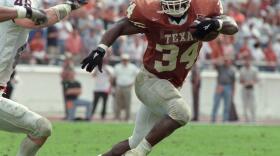Ruben Pizarro has been calling the Texas–Oklahoma game for a quarter century. It wasn't a job he set out to do.
His sports broadcasting career began while he was in residency at a Monterrey medical school.
“They didn’t have scholarships,” Pizarro said. “So, I paid for my post-grad doing newspaper, TV and radio.”
Pizarro rose quickly through the ranks. He was assigned national TV play-by-play duties for the 1987 Rugby World Cup championship. He crammed as much as he could before his boss handed him a microphone.
He says he did so well, his boss sent him to McAllen, Texas, to buy football magazines, two suits and four ties. When he returned, he was assigned to be part of the National Football League’s Mexico broadcast team, where his career continued to rise.
“I was a statistician for him,” Pizarro said. “The second game of the NFL, I was the color commentator. And then I went to the radio stations – 13 radio stations – and some other affiliates in Guadalajara and Mexico City, doing play-by-play and commentary, but by myself.”
All by the third game. The rest, you might think, is history – but not so fast.
“When I finished my residency, I graduated," he said. "I wanted to be known as a doctor, not as a commentator, so I quit all the media."
As quick as it took off, Pizarro was letting it go. But as a medical professional, he should have realized the broadcasting bug is hard to kick.
All The Right Words
In 1994, Raul Allegre, a kicker for UT and the New York Giants, was starting a new Spanish-language NFL show in Austin. He hired Pizarro to be a producer.
“Raul hired me mainly because I [knew all the terms] in Spanish, the only [English] word that I use is ‘touchdown,’" Pizarro said. "So, I brought in the whole lexicon, all the technical football for him, because he didn’t know.”
"I brought in the whole lexicon, all the technical football for him, because he didn't know."
At around the same time, UT hired Chris Plonsky to head the athletic department’s external affairs.
“The conference that I had come from, the Big East Conference, had Miami of Florida as a member,” said Plonsky, UT's current chief of staff and executive senior associate athletics director. “They had a strong robust [Spanish]-language network for their football, which at that point was [a] kingpin in our league ... the Miami Hurricanes.”
She discussed emulating the University of Miami with former athletics director DeLoss Dodds and the school’s radio broadcast partner, Host Communications (now IMG).
“Well, certainly, we got very fortunate because of Ruben and the people that were here that also had high interest in helping us situate,” she said. “To have Ruben recruit the individuals, his producer, his [color commentator], statisticians, all the things that have to go into the broadcast booth to make that game became a reality for listeners. … It was delightful.”
“The support from UT has been excellent,” Pizarro said. “There have been a couple of times when the project is close to dying, but it has been resuscitated by Chris Plonsky. IMG has always been supportive that UT wants this broadcast."
'Part Of The Family'
And the broadcasts took root. Pizarro gained a following for his nicknames – popular among players and coaches.
"When you and I are friends, we can call each other certain things. We make the players feel that, we are part of the family and you are part of us, too," he said. "Sam Ehlinger, The Indomitable – nobody can get over him or stop him or anything. Keaontay Ingram, The Knife – he cuts through defenses. Collin Johnson – The Marvel, La Maravilla.”
"You want to hear something from a fan perspective, and that's what he brings."
Longhorns fan Roberto Enriquez says when he’s on the road during games, he prefers the Spanish broadcast.
“Most of the time when you watch it on ... regular networks, they’re all cool calm and collected,” he said. “Sometimes that’s not what you want to hear. You’re a fan. You want to hear something from a fan perspective, and that’s what he brings.”
Pizarro calls radio “theater of the mind." He said UT's English-speaking play-by-play announcer, Craig Way, once told him he makes it sound like they’re going to score on every play.
"'Aren’t they?' I said. They could score on any play, so you’ve got to make it like it," Pizarro said. "So, that’s the way we do it.”
Expanding The Market
Maybe just as important as the execution is why the university chooses to broadcast in Spanish.
At least nine schools from the Power Five conferences (ACC, Big 10, Big 12, Pac 12 and SEC) have Spanish-language broadcasts. Oklahoma and Texas A&M are among them. New Mexico State just rebooted its Spanish-language efforts after taking three seasons off. Nebraska started up a broadcast this season – the first Big 10 team to do so.
“We know we have 500,000-plus alumni, but we’re living in a city now where the area of demographic influence is more than 2 million people,” Plonsky said. “And not all of those people look alike or talk alike, and we want to deliver to them, with a great spirited service, our game broadcast of football.”
This Saturday, Plonsky, La Maravilla, El Indomable, La Naraja and Longhorn fans will be hoping to hear a lot of at least one word in both the Spanish and English broadcasts: “Touchdown.”
You can hear Pizarro's broadcasts on 105.3, The Bat.






